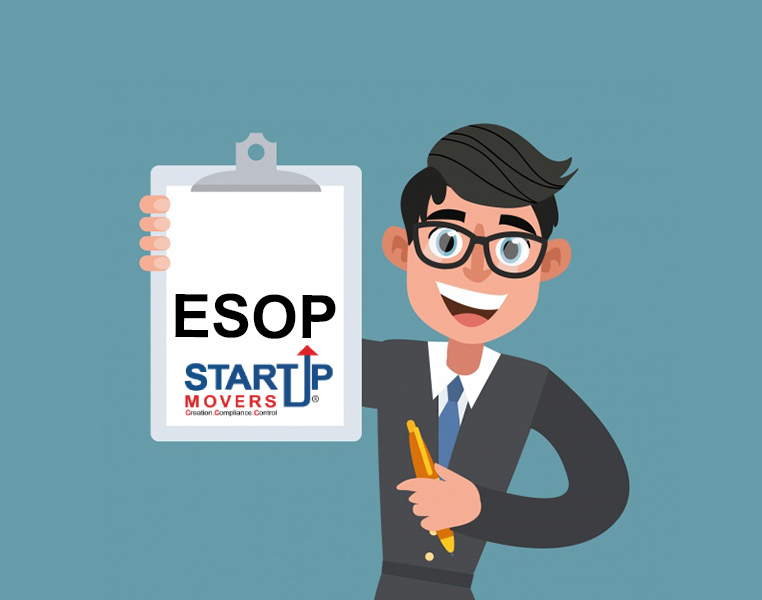Introduction
An ESOP (Employee stock ownership plan) refers to an employee benefit plan which offers employees an ownership interest in the organization. The ESOP is generally designed to benefit employees who remain with the employer the longest and contribute most to the employer’s success. Employee Stock Option Plans/Equity Incentive Plans (commonly referred to as ESOPs) are one of the most important tools to attract, encourage and retain Employees. It is the mechanism by which employees are compensated with increasing equity interests over time. Company grants an option to its Employee to acquire Equity Shares of the company at a future date and at predetermined price. There is no limit on quantum of ESOPs to be issued to employees
- Salient features of ESOPs
- Employees can acquire shares at a predetermined price
- Exercise of option is subject to vesting period
- Minimum period of one year between grant and vesting as per SEBI Guidelines
- Right to dispose of shares subject to lock-in period as may be determined by the company.
- Major terms to understand under ESOPs
- Grant-Offering of ESOP Options from Company to Employee
- Vesting- Process through which employee becomes eligible to exercise options
- Exercise- Exercise-When employee applies to company for getting shares allotted
- Exercise price- means the price, if any, payable by an employee for exercising the option
- Option- Option-means the option given to an employee which gives such an employee the right to purchase or subscribe at a future date, the shares offered by the company
- Regulatory Framework for ESOPs
-
- For Unlisted Company
-
-
- Companies Act, 2013 along with Rules
- Income Tax Act, 1961
-
- When Foreign employees are covered (applicable for listed and unlisted)
-
-
- Foreign Exchange Management Act, 1999
-
- For listed Company
-
-
- SEBI (SBEBSS) Regulations, 2021
- SEBI (LODR) Regulations, 2015
- SEBI (PIT) Regulations, 2015
- Income Tax Act, 1961
- Why ESOPs?
 Figure 1.1
Figure 1.1
- Advantages of ESOPs
- Increased productivity: The company gains employees’ goodwill, loyalty and commitment. Employees are motivated and encouraged to think like owners.
- Attracts Top Talent: Helps attract fresh talent on a regular basis. Having an opportunity to have a share in a company can be an attractive bonus for top talent seeking new job opportunities, as it provides a secure retirement plan.
- Finance growth: Can be used to finance growth through its tax-privileged status in a cost-effective manner.
- Improved Company relations: ESOPs Improve the communication between employee and managers and increase cooperation. The Employer shares the same interests with the Employee, which is to work together for the overall growth of the company.
- Tax Advantage: The tax benefits of an ESOP exit strategy can be significant. These benefits accrue to the selling shareholder(s) (the corporation), and to the employees who participate in the ESOP.
- Timely implementation: An external, third-party sale can be a lengthy process, with many moving parts. Owners looking to transition out of the company in short order, an ESOP can be an appealing option.
- Who is eligible for ESOPs?
- Only permanent employees of the company or its subsidiaries or its holding company are eligible for ESOP grants. Part-time employees, consultants, advisors, mentors are therefore NOT eligible for ESOPs
- Directors on the board whether a whole-time director or not, of the company or, its subsidiary company or its holding company are also eligible to receive ESOPs
- The founders/promoters of DPIIT recognized start-ups are eligible to receive ESOPs for up to 10 years from the date of incorporation.
- Restructuring modes under ESOPs
- Employee stock option plans- It is a right offered by the company to its employees to take equity shares of the company at a discounted price.
- Employee stock purchase plans- It allows employees to purchase company’s shares, often at a discount from fair market value
- Restricted stock units- A restricted stock unit is a form of compensation for employees, where the employing company presents one or more of its stocks to the person in question. The beneficiary is free to sell this stock whenever he/she wants if the same is not within its vesting period.
- Stock Appreciation Rights-Cash Settled- Cash-settled share-based payment transactions occur where goods or services are paid for at amounts that are based on the price of the company's equity instruments. The expense for cash settled transactions is the cash paid by the company.
- Stock Appreciation Rights-Equity settled- Equity-settled share-based payment transactions are transactions in which the entity receives goods or services in exchange for its own equity instruments (e.g., shares, options).
- Process of Issue of ESOP
- Preparation and approval of ESOP Scheme- ESOP Scheme needs to be prepared by the company and approved by the Board of Directors. Price of the shares issued pursuant to ESOP is also determined beforehand.
- Approval from shareholders: Take the shareholder’s approval for the issuance of shares through ESOP in the general meeting through special resolution.
- Dispatch of offer letters: Send options to the employees, directors and officers of the company for purchasing shares under ESOP.
- Vesting of options – There shall be a minimum period of one year between the grant of options and vesting of option
- Exercise of options by the employees
- After approval of ESOP scheme by the shareholders, grant options to the eligible employees.
- Allotment of Shares, as and when options are exercised
- Maintain a ‘Register of Employee Stock Options’
- What Company sees while granting ESOPs?
- Loyalty
- Performance
- Designation
- Present and potential contribution
- Opportunity cost
- ESOP Implementation Routes
- Direct Route: The company directly gives option to buy shares to employees.
- Trust Route: The company undertakes its ESOP plan through a Trust commonly known as employee welfare trust
- Tax Implication
- Exercise of option will have perquisite taxation under the head salary. Market price to calculate the perquisite of the shares becomes new cost price
- On sale of shares, gains will either be classified as long term or short term and will be chargeable under the head capital gains
Frequently Asked Questions
- ESOPs can be granted to Permanent Employees only. Who is a Permanent Employee?
The term Permanent Employee has not been explained in the enabling legal provisions of ESOP nor has it been defined under the Companies Act per se. Considering the practical aspects, in case of both Listed and Unlisted Companies, an employee who has satisfactorily completed the probation period can be considered to be a Permanent Employee.
- Is there any threshold on the quantum of ESOP and the number of employees for issue of ESOP?
There is no minimum or maximum threshold on the quantum of ESOP or the number of employees participating in ESOP. Also, the employees issued shares under ESOP are not counted in the maximum limit of shareholder (200) in case of Private Company in terms of the definition of Private Company under the Companies Act.
- Is ESOP transferable?
The options granted to employees shall not be transferable to any other person.
- Is it possible to pledge, hypothecate, or mortgage the ESOP?
The option granted to the employees shall not be pledged, hypothecated, mortgaged or otherwise encumbered or alienated in any other manner.
- What happens to the ESOP in case of employee’s death?
In the event of the death of employee while in employment, all the options granted to him till such date shall vest in the legal heirs or nominees of the deceased employee.
- What happens to the ESOP when employee suffers a permanent incapacity while in employment?
In case the employee suffers a permanent incapacity while in employment, all the options granted to him as on the date of permanent incapacitation, shall vest in him on that day.
- What happened to the ESOP when employees resign from the company?
In the event of resignation or termination of employment, all options not vested in the employee as on that day shall expire. However, the employee can exercise the options granted to him which are vested within the period specified in this behalf, subject to the terms and conditions under the scheme granting such options as approved by the Board.
- What is the typical cliff period and vesting curve in a startup?
Cliff period is the minimum time an employee needs to work in a company before any of the options can be vested. A minimum of 1 year cliff is required as per Indian laws and this is also the typical timeframe startups use for the cliff period.




 Figure 1.1
Figure 1.1 
